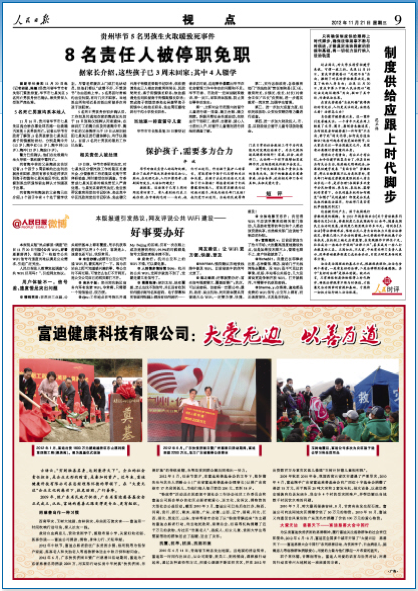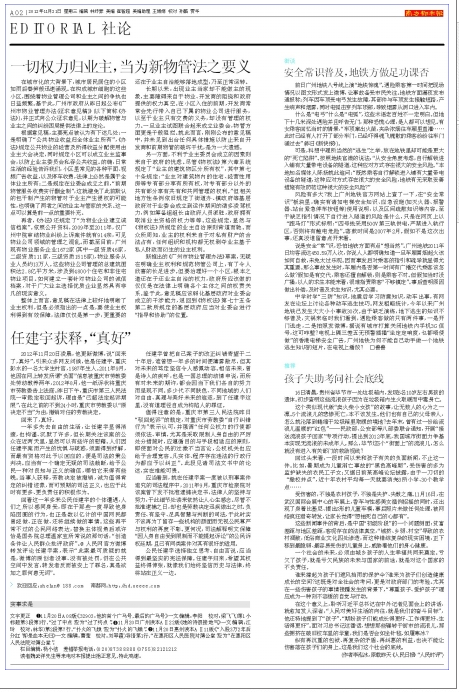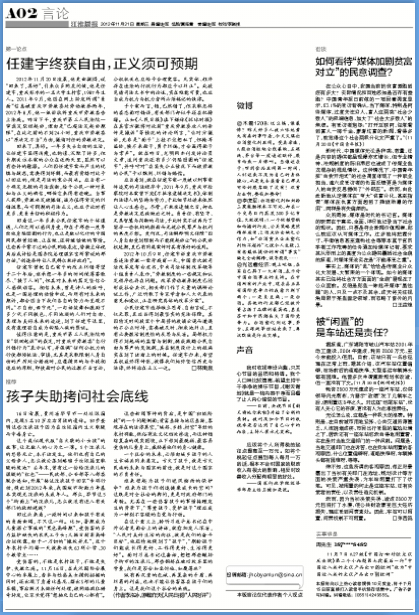On Monday, Ren Jianyu (任建宇), a young former village official in Chongqing’s Pengshui County, was released from a re-education through labor facility after serving 15 months of his two-year sentence stemming from comments posted to Sina Weibo in August 2011. Ren’s case has drawn an unprecedented level of attention inside China to serious problems with the country’s system of re-education through labor, or laojiao (劳教). [Background on the Ren case and his release].
Signaling that the laojiao issue is getting attention at senior levels in the Party leadership, the People’s Daily ran an editorial yesterday saying that the whole re-education through labor system was “now in the awkward position of being in violation of the law” thanks to legal advancements stipulating (as in China’s Legislation Law) that a citizen’s rights can only be curtailed by means of laws.
In a Weibo post sharing a link to the People’s Daily editorial, Zhu Huaxin (祝华新), director of the Public Opinion Research Center at People’s Daily Online, wrote: “People’s Daily has spoken: the system of reeducation through labor has found itself in violation of the law . . . “

[ABOVE: Yesterday’s edition of the People’s Daily runs an editorial on page 9 criticizing the re-education through labor system.]
Veteran journalist Fu Jianfeng responded: “This piece from the People’s Daily is a break with form. It’s the first time I’ve seen the People’s Daily criticizing the laojiao system. Is this a prelude to the abolishment of this nasty law allowing re-education through labor? I hope it is!”
The law Fu Jianfeng refers to is the Decision on the Question of Reeducation through Labor (关于劳动教养问题的决定), which went into effect back in 1957. Much of the concern today’s centers on how the laojiao system can be abused by local governments in China in cases like Ren Jianyu’s.
The English-language Global Times today called Ren’s release “an essential step toward more freedom of speech.”
In Chinese commercial media, perhaps the boldest voice on the issue came from yesterday’s Southern Metropolis Daily and its sister paper in Hefei, the Jianghuai Morning Post (江淮晨报). Below are partial translations of the editorials in both the People’s Daily and Southern Metropolis Daily.
“System Supply Should Keep Step with the Times“
November 21, 2012
For college student and village official Ren Jianyu (任建宇), the past two days have brought a series of ups and downs. First, on November 19, the Chongqing Municipal Reeducation through Labor Committee (重庆市劳教委), revoked its decision on [Ren’s] labor reeducation [sentence] and gave him his freedom, citing the reason that [his case] “had not been handled properly.” Then, on November 20, the Chongqing Third Intermediate People’s Court dismissed a lawsuit filed [by Ren against the Re-education through Labor Committee], saying that it had “passed the statutory prosecution deadline” [required by China’s Administrative Procedure Law].
After this “self-correction” on the part of the Chongqing Municipal Reeducation through Labor Committee received the general support of public opinion, what people are asking is: How do we view the courts? And what about the law?
Ever since Ren Jianyu was sent for reeducation through labor, this case has drawn the attention of the general public. A youth who only re-sent some text and images on the internet, and even the original creator [of this content] was never pursued? How can a shirt printed with the words, “Give me liberty or give me death,” become physical evidence of breaking the law? These details, which sound absurd, cause those paying attention to the original court case to think hard about reeducation through labor itself.
Only by being sensible can we be clean; only by being just can we have public integrity. Ren Jianyu now has his freedom, but as to why he lost his freedom in the first place, this is all still very unclear. If we say that Ren Jianyu’s “negative remarks” constituted guilt, well then, when prosecutors no longer find them to be a crime, is it reasonable for relevant [government] departments to deprive him of his personal freedoms for a year using the reeducation through labor system? When the national [Party and government] have on repeated occasions emphasized the people’s right to know, right to participate, right to express and right to monitor, how can the basic rights of the people avoid this threat of indiscriminate [justice]? Even in cases where a citizen illegally abuses his right to expression, do administrative departments have the right to simply take the matter into their own hands?
These questions have arisen from the unclarity of our reeducation through labor system as it is currently practiced. The system of reeducation through labor in our country has been in place for more than 50 years, ever since the 1957 “Decision on the Question of Reeducation through Labor” (关于劳动教养问题的决定). As democracy and rule of law have advanced in our country, the many shortcomings of this system have become apparent. In particular, since such laws as the Legislation Law (立法法) have been promulgated, it has been the case that the personal freedom of citizens can only be limited by the process of law — which means reeducation through labor is now in the awkward position of being in violation of the law. In addition, as the examination and approval process for reeducation through labor lies in the hands of public security organs, the necessary monitoring mechanisms are not in place. Inevitably, there is great license in the actual exercise [of the system], so that it has become in some areas a “legal loophole” (法律小灶), or even a tool of retaliation wielded by the few. For this reason, not long ago, a responsible person from relevant central-level departments said that broad consensus had already been reached on the need for reform of the reeducation through labor system, and that a reform program was being explored.
Rule of law is the fundamental method of governing a nation. According to classical theory, rule of law has two key elements. The first is good laws; the second is general respect for the law. Of these, [the need for] “good laws” is the fundamental precondition. In this regard, it is only by ensuring that system supply maintains step with the times, and by ensuring that laws and regulations constantly advance with the times, that we can meet the preconditions and firm up the foundations for a country ruled by law, bringing every operation of power under rule of law.

[ABOVE: Yesterday’s edition of the Southern Metropolis Daily runs an editorial criticizing the re-education through labor system.]
The following was the lead editorial yesterday in both the Southern Metropolis Daily and the Jianghuai Morning Post.
“Ren Jianyu’s Release is ‘Great’“
Southern Metropolis Daily, AA02
November 21, 2012
In the early hours of November 20, 2012, he refreshed his Weibo account and wrote, “It’s great to be back.” This prompted a wave of well-wishing from web users. His is Ren Jianyu, a college student and village official from Chongqing’s Pengshui. He was born in 1987. In September 2011, he was sentenced to two years of reeducation through labor for posting “negative” information on the internet. In August 2012, he filed a complaint in court against the Chongqing Municipal Reeducation through Labor Committee. Yesterday afternoon, the Chongqing Third Intermediate People’s Court dismissed [Ren’s] complaint [against the ], giving the reason that it had “passed the statutory prosecution deadline.” In the less than 24 hours prior to this, the Chongqing Municipal Reeducation through Labor Committee cancelled Ren’s reeducation through labor sentence on the grounds that his case “had not been handled properly.”
“It’s great to be back”
Losing his life of freedom for more than a year has been a huge strain on Ren Jianyu, and he is now more cautious and reserved. But the events of the past two days provide some solace for those who have long followed Ren’s case. The people need answers to the fear and doubt created by the Ren Jianyu case, and the most welcome response would be a judicial process rendering justice. There needs to be a judicial decision that is beyond doubt, serving as an assurance of conscience and justice — even if it comes a bit late.
The release of [Ren Jianyu] and the cancellation of his reeducation through labor sentence is a welcome sign. But at this time, a process of judicial justice (司法正义) would have a greater and more responsible effect.
Looking back on the experiences of the citizen Ren Jianyu over the past year and more, one thing people feel quite personal about is the fact that the conduct that landed him in trouble is the same behavior hundreds of millions of internet users in China have regularly engaged in and are still engaging in. The ordinary instances of web users expressing themselves are . . . in fact precisely what Premier Wen Jiabao was talking about when he said [the government needed to] “create the conditions for the masses to criticize the government.”
@People’sDailyOnline (@人民网), the official Weibo [of the People’s Daily Online website], said in a re-post on the Ren Jianyu case that “what prompts serious questioning in this case is that nothing whatsoever happened to the original creator [of the content in question], no penalties were given and [they] are still speaking in the public space, while the person who re-posted this content was branded a criminal. A true example of the saying that if you want to condemn someone you can always trump up a charge.”
. . .
The citizen Ren Jianyu, in deciding to think for himself and speak freely, should received the determined protection of the constitution. With Ren Jianyu’s return, we hope that his rights and interests have prevailed, just as we believe to the last that history and the law will stand ultimately on the side of justice.

[ABOVE: Yesterday’s edition of the Jianghuai Morning Post runs an editorial criticizing the re-education through labor system.]




















